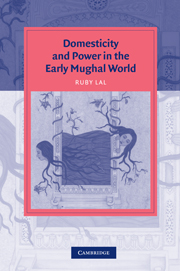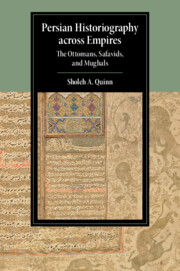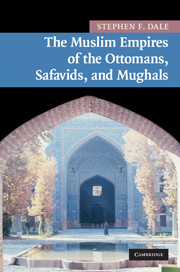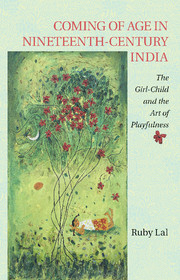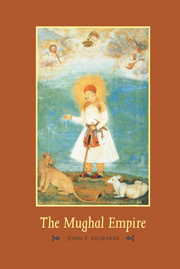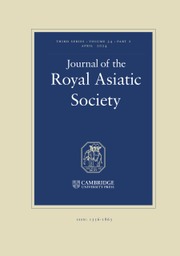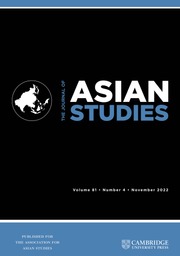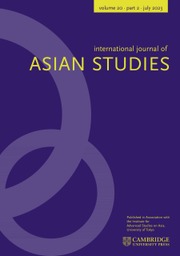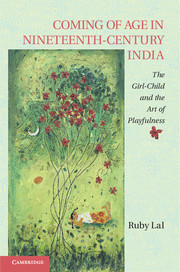Domesticity and Power in the Early Mughal World
Part of Cambridge Studies in Islamic Civilization
- Author: Ruby Lal, Emory University, Atlanta
- Date Published: September 2005
- availability: Available
- format: Paperback
- isbn: 9780521615341
Paperback
Other available formats:
Hardback
Looking for an inspection copy?
This title is not currently available for inspection. However, if you are interested in the title for your course we can consider offering an inspection copy. To register your interest please contact [email protected] providing details of the course you are teaching.
-
In a fascinating and innovative study, first published in 2005, Ruby Lal explores domestic life and the place of women in the Mughal court of the sixteenth century. Challenging traditional, orientalist interpretations of the haram that have portrayed a domestic world of seclusion and sexual exploitation, the author reveals a complex society where noble men and women negotiated their everyday life and public-political affairs in the 'inner' chambers as well as the 'outer' courts. Using Ottoman and Safavid histories as a counterpoint, she demonstrates the richness, ambiguity and particularity of the Mughal haram, which was pivotal in the transition to institutionalisation and imperial excellence.
Read more- Through memoirs and archives, the author unlocks the intrigues of the Mughal haram, and its elaborate political and personal negotiations
- There are other books on the topic, but this is the first to consider the Mughal court and to challenge the more traditional orientalist perspectives of the adjacent literature
- A must-read for students and scholars of South Asian, Persian and Turkish history, and for those in women's studies
Reviews & endorsements
'Arguably this is the most important book to appear on Mughal history for a generation … Lal has rescued the engagement of women with the world from a patriarchal and orientalist historiography which hid it from view.' Francis Robinson, Royal Holloway, University of London
See more reviews'Dr Lal's monograph is a highly imaginative study of family life under the first Mughal rulers of India based on a very sophisticated use of source material. It questions the received wisdom on life in the haram and opens up a very original line of enquiry into the role of women in the society and politics of the early Mughals. I feel sure that it will be received as a pathbreaking work.' Tapan Raychaudhuri, Emeritus Fellow, St Antony's College, Oxford
'This book is an original and signal contribution to the study of women, family, court cultures, and the politics of empires. By examining the shifting political contexts of the first three Mughal generations - of women and men - Ruby Lal demonstrates the evolution of a 'domestic' politics that lay at the heart of imperial self-fashioning.' Leslie Peirce, Professor of Ottoman Studies, University of California, Berkeley
'… we could not expect the book to be more inclusive. Jan-Peter Hartung's scholarly introduction to the book binds these diverse articles into a complete unit and his empathetic approach in comparing and analysing the Islamic education in various countries, leaves a positive imprint on the heart of the reader. … a sincere attempt to understand the history, working and objectives of madrasas in India.' Economic and Political Weekly
'… medieval Indian court … has emerged as an important field of study … The book under review is a valuable addition to this stream … comprehensive analysis of how contemporary European travelers viewed the Mughal haram … Ruby Lal studies the early Mughal haram in a meticulous and creative way … Discussing medieval culture, a historian should adopt a somewhat anthropological technique … The author manages this technique successfully … The author's main contribution and success in her study is in showing the institution of the Mughal haram as being fluid and responsive to the changing socio-political and cultural environment … equally skilful in delineating the social and emotional links within this haram world. Especially impressive is the research into the various roles of women, especially elder ones, in family and clan relations, and the political and religious life of the nascent empire … Pre-modern India is but rarely discussed by scholars as an integral part of a greater medieval world … comparative study of Mughal, Safavid and Ottoman harams … commendable indeed … this study will serve to inspire further questions and criticisms from readers, as a good piece of research should … well-written and thought-provoking work, a welcome addition to medieval Indian studies and useful reading for those interested in Mughal history and culture.' Journal of International Asian Studies
'One of the most significant contributions of this book is its attempt to place this history of the early Mughal household within the comparative context of Muslim imperial polities in early modern Asia.' The Medieval History Journal
Customer reviews
Not yet reviewed
Be the first to review
Review was not posted due to profanity
×Product details
- Date Published: September 2005
- format: Paperback
- isbn: 9780521615341
- length: 260 pages
- dimensions: 229 x 152 x 15 mm
- weight: 0.44kg
- contains: 6 b/w illus.
- availability: Available
Table of Contents
1. Introduction
2. A genealogy of the Mughal haram
3. The question of the archive: the challenge of a princess's memoir
4. The making of Mughal court society
5. Where was the haram in a peripatetic world?
6. Settled, sacred, and all-powerful: the new regime under Akbar
7. Settled, sacred, and 'incarcerated': the imperial haram
8. Conclusion.
Sorry, this resource is locked
Please register or sign in to request access. If you are having problems accessing these resources please email [email protected]
Register Sign in» Proceed
You are now leaving the Cambridge University Press website. Your eBook purchase and download will be completed by our partner www.ebooks.com. Please see the permission section of the www.ebooks.com catalogue page for details of the print & copy limits on our eBooks.
Continue ×Are you sure you want to delete your account?
This cannot be undone.
Thank you for your feedback which will help us improve our service.
If you requested a response, we will make sure to get back to you shortly.
×
